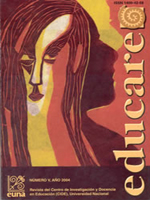Desarrollo profesional en la Universidad Nacional: construcción de un modelo para los talleres pedagógicos
DOI:
https://doi.org/10.15359/ree.2004-5.9Abstract
In the face of the changes of paradigm that have been emerging in the pedagogical practice; changes that take place on a daily basis in all educational contexts within the Universidad Nacional, it is necessary to give professors opportunities to make critical reflections on their pedagogical practices, focusing on the transformation of those practices in order to reach more quality in higher education.
In several activities that foster professional development within the university it has been possible to identify scholars who, both individually and in joint efforts, make this kind of reflection. This strength must be magnified in all the university in order to have a holistic training of all the agents taking part in the institution's teaching-learning processes.
This is why in recent years more opportunities have emerged to reconsider classroom work. As a result, these activities are now part of the institutional agenda. In addition, due to the process of reorganizing the school year, new spaces are opening up to discuss several aspects that will impact the new organization in one way or another. Reorganizing the new school year requires to construct a new pedagogical perspective that needs to give special importance to training and updating within the university.
Under this framework, all the teaching agents—professors and students—achieve special relevance since learning processes are emphasized (instead of methodology per se, as it occurs when teaching practices are based on a traditional view of these processes).References
Delors, Jacques (1996). La educación encierra un tesoro. Madrid:
UNESCO-Santillana. 318 p.
Elliot, J. (1996). El cambio educativo desde la investigación acción. Madrid:.Morata. 190 p.
Elliot, J. ( 1997). La investigación acción en educación. Madrid: Morata. 329 p.
Femández, María del Pilar ( 1993). Aula taller. Sinónimo de hombre abierto. Buenos Aires: Bonum.72 p.
Fernández, Miguel ( 1995). La profesionalización del docente. Perfeccionamiento. Investigación en el aula. Análisis de la práctica. Madrid: Siglo XXI.
p.
Goetz, J.P. y Le Compte, M.D. (1988). Etnografía y diseño cualitativo en investigación educativa. Madrid: Morata. 279 p.
Inostroza de Celis, Gloria y colaboradores (1996). Talleres pedagógicos. Alternativas en formación docente para el cambio de la práctica de aula. Chile: UNESCO. Dolme"n. 185 p.
Matiru, Barbara ( compiladora)( 1990). Report on the Sub-regional Workshop in Hare, Zimbawe. Bonn: Education, Science and Documentation Centre. 240 p.
Maxwell, Joseph A. (1996). Qualitative Research Design an Interactive
Approach. California, U.S.A.: Sage Publications. 153 p.
PaseL Susana y Asborno. Susana ( 1993 ). Aula- taller. Buenos Aires:
Aique.186 p.
PIIE. (s.f.). Talleres de educacion democratica. Santiago. Chile. Mimeográfo.
Rosario, Víctor Manuel (2000). El método para transformar la práctica
docente. Fundamentos para la construcción de propuestas para innovar la práctica. México: Universidad de Guadalajara. 108 p.
Rueda Beltrán, Mario y Campos, Miguel Ángel ( 1992). Investigación
etnográfica en educación. México D.F.: UNAM. 397 p.
Rueda Beltrán, Mario y colaboradores (1994). La etnografía en educación. Panorama. prácticas y problemas. México D.F.: CISE-UNAM. 623 p.
Sánchez, Marta Eugenia (2000). Una nueva mirada a los procesos de lectura y escritura. Tesis para optar por el Grado de Doctora en Educación. Universidad Estatal a Distancia. Sistema de Estudios de Posgrado. San José. 284 p.
Sánchez, Marta Eugenia, Flores, Luz Emilia y Céspedes, Edgar (2001).
Sistematización de una experiencia de capacitación. Aprendiendo
desde la práctica pedagógica. Heredia: Universidad Nacional. OIM. M.E.P. 117 p.
Sánchez, Marta Eugenia, Flores, Luz Emilia y Céspedes, Edgar (2001 ). Comunicación y lengua escrita: transitando entre el contexto social y el texto escrito. Repensar la práctica pedagógica. Heredia: Universidad Nacional. OIM. M.�.P. 97 p.
Shagoury Hubbard, Ruth y Miller Power, Brenda (1993). T he Art of
Classroom Inquiry. A handbook for teachers-researchers. New Hampshire. U.S.A.: Heinemann. 171 p.
Taylor, S.J. y Bodgan, R. (1996). Introducción a los métodos cualitativos de investigación. Barcelona: Paidós, S.A. 343 p.
Tsui, Lisa (2002). Fostering critica[ thinking throught effective pedagogy. En: The joumal higher education. Ohio,U.S.A.: The Ohio State University. 700-736 p.
Woods, Peter (1989). La escuela por dentro. La etnografía en la investigación educativa. Madrid: Paidós-M.E.C. 220 p.
Published
How to Cite
Issue
Section
License
1. In case the submitted paper is accepted for publication, the author(s) FREELY, COSTLESS, EXCLUSIVELY AND FOR AN INDEFINITE TERM transfer copyrights and patrimonial rights to Universidad Nacional (UNA, Costa Rica). For more details check the Originality Statement and Copyright Transfer Agreement
2. REUTILIZATION RIGHTS: UNA authorizes authors to use, for any purpose (among them selfarchiving or autoarchiving) and to publish in the Internet in any electronic site, the paper´'s final version, both approved and published (post print), as long as it is done with a non commercial purpose, does not generate derivates without previous consentment and recognizes both publisher's name and authorship.
3. The submission and possible publication of the paper in the Educare Electronic Journal is ruled by the Journal’s editorial policies, the institutional rules of Universidad Nacional and the laws of the Republic of Costa Rica. Additionally, any possible difference of opinion or future dispute shall be settled in accordance with the mechanisms of Alternative Dispute Resolution and the Costa Rican Jurisdiction.
4. In all cases, it is understood that the opinions issued are those of the authors and do not necessarily reflect the position and opinion of Educare, CIDE or Universidad Nacional, Costa Rica. It is also understood that, in the exercise of academic freedom, the authors have carried out a rogorous scientific-academic process of research, reflection and argumentation thar lays within the thematic scope of interest of the Journal.
5. The papers published by Educare Electronic Journal use a Creative Commons License:














 The articles published by Educare Electronic Journal can be shared with a Creative Commons License:
The articles published by Educare Electronic Journal can be shared with a Creative Commons License: 



